
| Themes |
| Programme |
| - 22 Jan. 2007 |
| - 23 Jan. 2007 |
| - 24 Jan. 2007 |
| Special Events |
24 January 2007 (Wednesday) |
Sustainable development in the states of India In order to achieve sustainable development, it is imperative that the basic philosophy of sustainability is percolated down to the local level. Therefore, initiatives at the local, state, and national levels have to go hand in hand and with equal thrusts. The session showcased initiatives by Indian states where involvement of the stakeholders and community had delivered positive results.
As the exploitation - driven by the prevailing development paradigm – of natural resources refusing to relent, management of these resources holds the key for sustainable development. In this context, citing the dwindling situation of water resources, the need for putting in place integrated watershed management was emphasized. A case in point is the management undertaken by communities in the Jhabua district of Madhya Pradesh where, even during the worst drought, villages had adequate water to meet their needs.
People’s participation in the Joint Forest Management programme was considered by speakers to have reaped positive results. Also, promotion of organic farming was cited as a good example of sustainable development initiative. Villages that have taken up organic farming have a cleaner look and they have improved sanitation facilities. Conservation of biodiversity holds another key role in meeting the sustainability goals. Several policy measures undertaken to this regard by Uttarakhand – the Himalayan state in North India – were discussed. Also featured in the discussion were the increasing trends of migration that pose crucial challenges and burden in terms of managing natural resources sustainably. Increasing slum population has taken a toll on resources with increased problems of waste management, water and energy availability, transportation, and affordable housing. In the National capital Territory of Delhi, involvement of resident welfare associations, traders association, and youth groups in tackling several issues have clearly reaped positive results. It was agreed upon, in the session, that multi-stakeholder participation, therefore, holds the key to meeting the goals.
|
||||||||||||||||
| Session Panelists | ||||||||||||||||
| Keynote Address Setting the theme Chair |
Speakers
|
|||||||||||||||
| Top | ||||||||||||||||
| Keynote Address: Technological breakthrough, the key to sustainable development |
| The keynote presentation delivered by Mr Tsutomu Makino was divided
into three sections. The first gave a broad overview of the global
energy situation and recent changes in it. This section focused on
the energy challenges faced by the world, with a special emphasis
on Asia and the United States of America. Japan’s experiences
in dealing with the two oil crises in the past were also mentioned.
Other issues discussed by Mr Makino include the importance of technology
to reduce carbon dioxide emissions and the energy strategies of major
countries.
The second section of the keynote address touched upon the significance of energy conservation in Japan. Mr Makino talked of the highlights of conservation projects in Japan, their impact, and economic benefits. He also discussed the impact of new energy technology and distributed systems in Japan, including solar and biomass. In the third segment of his presentation, Mr Makino turned the delegates’ attention to Indo-Japan cooperation on energy issues. He said that energy conservation has become necessary in India to offset the rapid increase in energy consumption here. As NEDO has experiences in this field, Mr Makino expressed NEDO’s willingness to act as a link between Indian and Japanese firms who wish to share knowledge in this field. He also discussed three energy conservation model projects that have already been implemented by NEDO in India. |
| Session Panelists |
| Chair Speaker |
| Top |
| Sustainable development in Africa - Ministerial perspectives |
| Africa is lagging behind in meeting the MDGs and the international
community must commit to help—not as a short-run fix, but as
a long-term sustainable development solution. The specific challenges
faced by Africa include increasing crop yield to feed the growing
population; reversing unsustainable exploitation of natural capital
and water; dealing with diseases like HIV/AIDS, tuberculosis, and
malaria; and coping with harsh natural disasters like drought and
famine. Besides, African countries are constrained by huge debt burdens,
poorly developed markets, and limited ODA (overseas development assistance).
Also, the sub-Saharan Africa is the most vulnerable to climate change.
Mr Anand Sharma, Minister of State, Ministry of External Affairs, Government of India, elaborated Indian efforts towards facilitating sustainable development in Africa. He mentioned that India’s model of development through democracy and intermediate technology is of particular relevance to Africa. India indeed has a long-standing relationship with Africa, and critical modes of cooperation include capacity building, concessional financial assistance, support to the regional group NEPAD, and assistance for development of small and medium enterprises. Developed countries, on the other hand, should open up markets for African products and ensure that agricultural subsidies in their domestic markets do not adversely affect markets for African produce. Mr Svend Auken, (opposition) Member of Parliament, Denmark, stressed the need to invest in renewable energy in decentralized forms, and promote dry-land agriculture. There is need for concerted efforts to increase ODA and enhance trade cooperation. He felt that Africa could also benefit significantly from the clean development mechanism. Former French Minister, Mr Brice Lolonde cited the specific case of the palm oil tree to illustrate the sustainable development challenge in Africa. The session concluded with a reiteration of needs to strengthen international initiatives to place Africa on a sound and sustainable growth path. |
| Session Panelists |
| Chair Setting the theme Speakers Summary and Concluding address: |
| Top |
| Water: the need for integrated water resource management systems – Ministerial perspectives | |
| The final session of DSDS 2007 delved into the critical
need for IWRM (integrated water resource management) to ensure access
to water for productive and consumptive purposes. Speakers pointed
out that current constraints in IWRM are characterized by growing
water demand but near constant resource availability. Moreover, the
decline in the availability of surface water has increased the extraction
of groundwater, leading to diminishing groundwater reserves. The challenge
before nations today is to accelerate IWRM with more effective regional
and inter-regional partnerships. The session also recognized the growing
threats to water availability due to climate change and trans-boundary
conflicts. Another relevant factor for IWRM is effective implementation. The Pakistan government’s experience in pursuing a two-pronged approach – of supplying clean drinking water for all while ensuring source water sustainability – was shared during the session.
Speakers agreed that water must be handled functionally rather than politically to ensure sustainable water management. At a national level, the focus needs to be on three areas: placing IWRM within the national development strategy, optimizing technological usage for efficiency improvement, and encouraging participation from all stakeholders. Simultaneously, there is a need for technology transfer, sharing of best practices, and effective practical decision-making tools that can hasten the implementation of IWRM projects. Speakers also argued for directives and frameworks within which governments can operate to effectively operationalize IWRM. Speakers were unanimous in their assessment of IWRM as an important tool to improve and maximize economic benefits and social benefits in an equitable manner without compromising on the sustainability of vital environmental systems. Therefore, an enabling environment to promote IWRM needs to be fostered. |
|
| Session Panelists | |
| Chair Setting the theme Speakers
|
Speakers |
| Top | |
| Concluding and valedictory session | |
| The valedictory session commenced with Dr R K Pachauri,
Director-General, TERI, summarizing proceedings of the three-day conference
that covered a wide-ranging subjects. He mentioned that adequate attention
was paid to the growing threat of climate change and the looming water
crisis.
Dr Pachauri also spoke about the detailed exercise on water that the Earth Institute and TERI would carry out in the coming year. Other highlights such as the launch of the India Council for Sustainable Development, updates on the extensive study titled Green India 2047, and the meeting with the patrons of the World Business Council for Sustainable Development were also mentioned.
The Sustainable Development Leadership Award was presented to Governor Arnold Schwarzenegger of California for his leadership role in instituting emission standards in his home state. The award was received by Dr Alan C Lloyd, President, International Council on Clean Transportation, USA, who also delivered Governor Schwarzenegger’s acceptance speech on his behalf. Mr Chaitanya Kalbag, Editor-in-Chief, The Hindustan Times, reiterated the fact that Delhi was on the verge of desertification after having reversed centuries of ecological balance.
Addressing issues such as agriculture and energy, Mr Ramesh talked in terms of the looming challenge of feeding a growing population. Food security, he said is a central element in any theorization on sustainable development. Stressing on the need for R&D in the public domain, Mr Ramesh raised the issue of the commercialization of energy and the future increase in the use of fossil fuel—an inevitable outcome of a high-growth strategy. Bringing the three-day long deliberations to a close, Ms Annapurna Vancheswaran, Associate Director, TERI, thanked the distinguished speakers and sponsors. She also praised the efforts of colleagues in the TERI Press and the Programme Cell. |
|
| Session Panelists | |
| Chair: Welcome and DSDS 2007 summary |
Address by the Chief Guest Vote of Thanks |
| Top | |
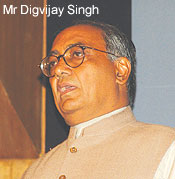 In
Madhya Pradesh, for instance, stakeholder involvement through demand
driven initiatives in health and education sectors has clearly made
a visible shift in the quality of lives of the people. Direct participation
of community representatives in a rural primary education programme
in the state has inculcated a rare sense of ownership and responsibility
in the people, resulting in the success of the effort. The Jan Swasth
Rakshak (barefoot doctors) programme of the state also boasts of
a similar inspiring result where local villagers were trained with
UNICEF’s support to ensure primary health care to all.
In
Madhya Pradesh, for instance, stakeholder involvement through demand
driven initiatives in health and education sectors has clearly made
a visible shift in the quality of lives of the people. Direct participation
of community representatives in a rural primary education programme
in the state has inculcated a rare sense of ownership and responsibility
in the people, resulting in the success of the effort. The Jan Swasth
Rakshak (barefoot doctors) programme of the state also boasts of
a similar inspiring result where local villagers were trained with
UNICEF’s support to ensure primary health care to all. 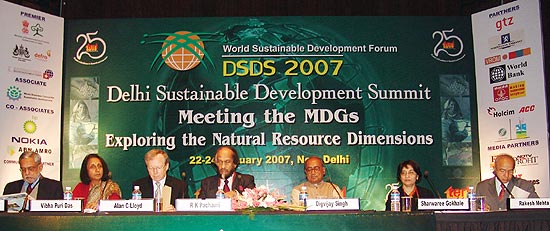
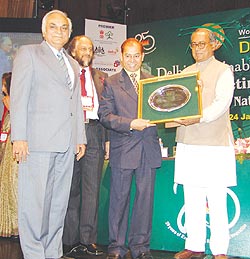
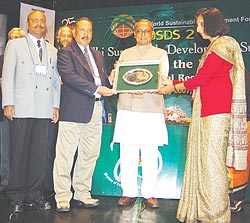
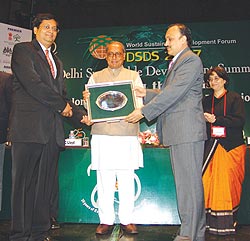
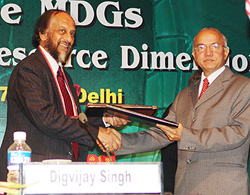
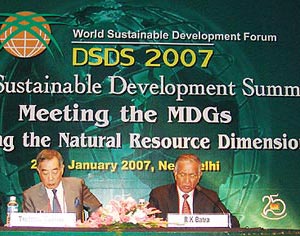
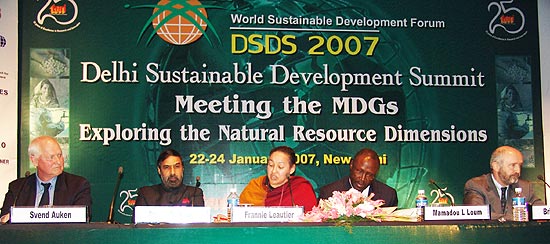
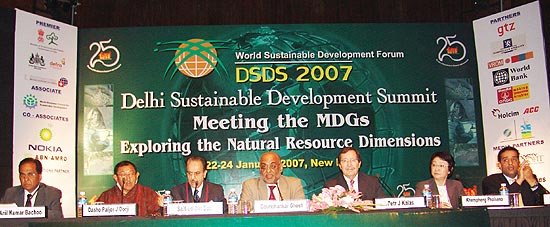
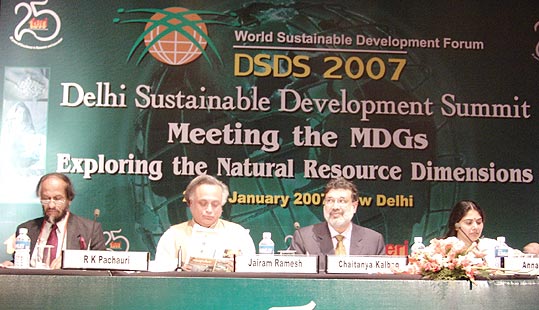
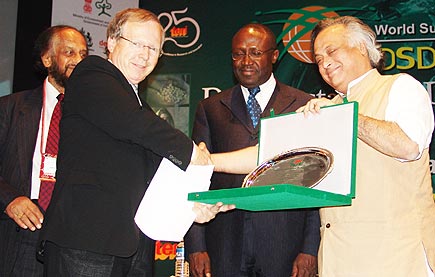
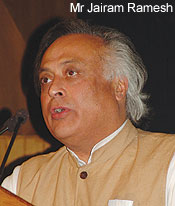 Delivering
the valedictory address, Hon’ble Minister of State for Commerce
and Industry, Mr Jairam Ramesh, stressed on the demographic dimension
as an imperative in all future thinking on sustainable development.
He also stressed that higher growth has to be supported by targeted
interventions in the social sector.
Delivering
the valedictory address, Hon’ble Minister of State for Commerce
and Industry, Mr Jairam Ramesh, stressed on the demographic dimension
as an imperative in all future thinking on sustainable development.
He also stressed that higher growth has to be supported by targeted
interventions in the social sector.